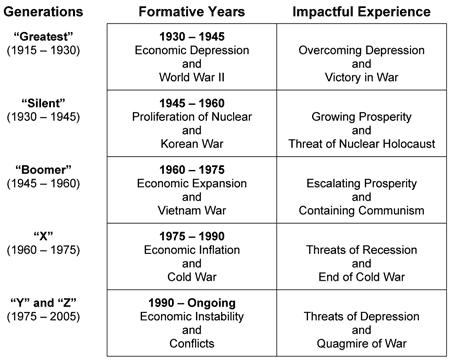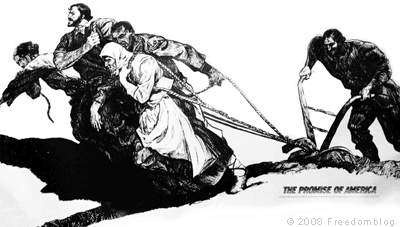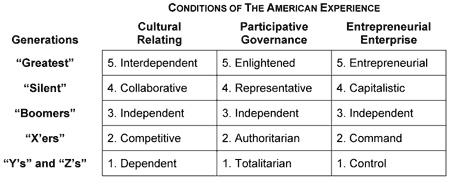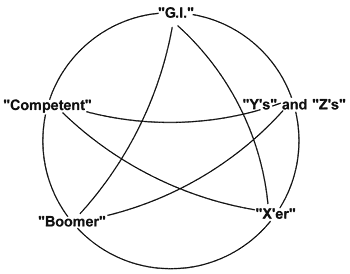When I picked up the phone on the conference call, I realized that we had another crisis on our hands. First, there was the crisis at The Village Charter School which we needed to process. Now, there was a second—even greater crisis—of generational experience.
I began by saying “We have to give the children ‘The American Experience’.” I soon realized that some understood what this meant because they had been through it. Others did not know what this meant because they had never been through it.
I adjusted accordingly: “Ed and Harry know what I’m talking about. John and Dale do not fully understand.”
In one room, we had representations of four generations: “G.I.,” “Silent,” “Boomer,” and “X’er.” “The American Experience” had a different meaning for each of them. The burning issue of education was this: “How could we deliver ‘The American Experience’ to the children if we, their mentors, did not understand it?”
This differentiated meaning generated differences—great and small—in our objectives for our school children. This same differentiated meaning is now generating differences—great and small—for our election of a president to save our country!
The Generational Experience
The differential impact of generational experience may be viewed in Table 6-1. As may be noted, each generation has totally different impactful experiences in its formative years.
Table 6-1. Differential Impact of Experience on Formative Years

The impact of experience upon maturity is a function of the power of the experience on the formative years in their development, usually between 15 and 25 years of age. Please note also that generations are defined in 15-year intervals due to the regular emergence of impactful experiences.
It may also be noted that the impactful experiences of the formative years are defined domestically by the economy and internationally by wars that occurred in approximately 15-year intervals.
“The Greatest Generation”
“The Greatest Generation” was a generation born approximately between the years 1915 and 1930. So labeled by Tom Brokaw in his book on the subject, this generation is also known as the “G.I. Generation” due to their successful experiences in World War II. The most powerful experiences during its formative years were the Great Depression of the 1930s and the World War of the 1940s. The impact of these experiences produced the so-called “Greatest Generation.” They had witnessed overcoming the Great Depression. They were instrumental in empowering the Allied Forces to winning the war. It was this victory against the two most formidable military forces in the history of the world that emboldened them in civilian life and entitled them to the adjective “Greatest.”
“The Silent Generation”
“The Silent Generation” was a generation born roughly between the years 1930 and 1945. So-labeled by political pundits, this generation is also known as “The Competent Generation” due to their successful implementation of the “grand ideas” of the politically-empowered “G.I.s”. The most powerful experiences during its formative years were the proliferation of Nuclear Weapons and the quietly enacted Korean War. The impact of these experiences produced both “Competency” and “Silence.” They had to engineer the Post-War Prosperity. They came to fear the threat of nuclear holocaust.
“The Boomer Generation”
“The Boomer Generation” was a generation born between the years 1945 and 1960. So-labeled by educators and service providers, this generation is known for “Booming Numbers.” With over-crowded classes and social promotions, this generation took on a consensus-driven character of its own. The most powerful experiences during its formative years were unparalleled economic expansion and the controversial Vietnam War. The impact of these experiences produced “Go-Stop” Schizophrenia: the Escalating Prosperity of “The Go-Go Economy” and the Paranoid Fear to “Stop-Stop Communism.” They had to develop “New Trade Paradigms” while implementing “Old Containment Policies”—a confusion of motives that led to a neutralizing disposition to “Consensus-Building.”
“Generation X”
“Generation X” was a generation that was born approximately between the years 1960 and 1975. So-labeled by themselves and others, they are to this day an unknown factor in the equation for life. Dwarfed by undernourishment from their “Boomer” elders, this generation set out to make it on its own, seeking identity in independence of specialty areas and skills.
The most powerful experiences during its formative years were the economic inflation that exploded in the “dot.com bust” and the escalation of the Cold War that foreshadowed its ending.
Together, these manic-depressive experiences produced a bi-polar personality which validates “the X-factor.” Its members learned the basic principles of “The Schizoid Life:” we need to “push” in order to “pull;” we need to “pull” in order to “push.” So “ready—fire—aim!”
“The Y and Z Generations”
“The Y and Z Generations” are those born roughly between 1975 and 2005. They are bundled together because we still do not know who they are. Their formative years are on a continuum flowing from the end of “The Cold War in 1989:”
- An intensifying period of economic instability leading to chaos;
- An intensifying commitment to war in the Middle East leading to quagmire.
The impact of these experiences has been “The Digital Generation:” they live inside of the technologies that previous generations built. In other words, the bi-polar personality of the “X’ers” has been extended into the “Pathological Schizophrenia” of “on-line” and “off-line” life.
For all of these analyses, it is worth noting that the generational view is “actuarial and probabilistic.” There are powerful exceptions that are individualistic and possibilistic: Moreover, the variability within a generation is greater than the variability between generations. However, we proceed with the generational hypotheses because of their testable and heuristic value.
Summary and Transition
The impact of powerful experiences is contingent not only upon the formative years in maturity. It is also contingent upon the maturity of the generations (see again Table 6-1).
“The Greatest Generation” was just that—”the greatest!” Its members were there at the genesis of the 20th century version of “The American Experience.” Many of its members were first-generation Americans who survived “The Great Depression” and grew with “The Great War.” Phenomenally, they could not be stopped from doing anything. All things were possible!
“The Silent Generation” was silent because it lived in the shadow of “The Greatest.” Serving as “hand-maidens” to the grand ideas of their leaders, this generation became “The Competent Generation.” As executives and architects, engineers and managers, builders and salesmen, they transformed “The Possibilities of The Greatest” into “The Probabilities of The Latest!”
“The Boomers,” in turn, were the children of “The Greatest,” not of “The Latest.” Because “The Greatest” held office for more than 50 years after the war, they felt obligated to pass-over “The Silent Ones” and crown their “Boomer-children” with the cloak of leadership. They had not trained them, for they relied upon “The Competent Ones” to do so. Unfortunately, one-by-one, “The Boomers” capitulated because they had not been prepared for effort, only for rewards. And as a country, we moved farther and farther from the leadership qualities that made us great!
“The X’ers” were a pale image of “The Boomers.” This is because “The Boomers” were adopted by “The Competent Ones” who, in turn, refused to adopt “The X’ers” for fear of competition. Unless “The Competent Ones” did double-duty and reared yet another generation, “The X’ers” were abandoned. Indeed, abandonment was the theme of their neurosis. In their bi-polar pathology, the only thing that they feared more than being abandoned was being freed!
The “Y’s” and “Z’s,” know so little and expect so much. These “Digital Youth” search for meaning in their lives in “the dysfunctional autonomy” of the I-net. They have become agents of consumption rather than production as they plod toward their inevitable pathological conclusions: isolated, insulated, and perforated.
My God! What have we done to our grandchildren!









